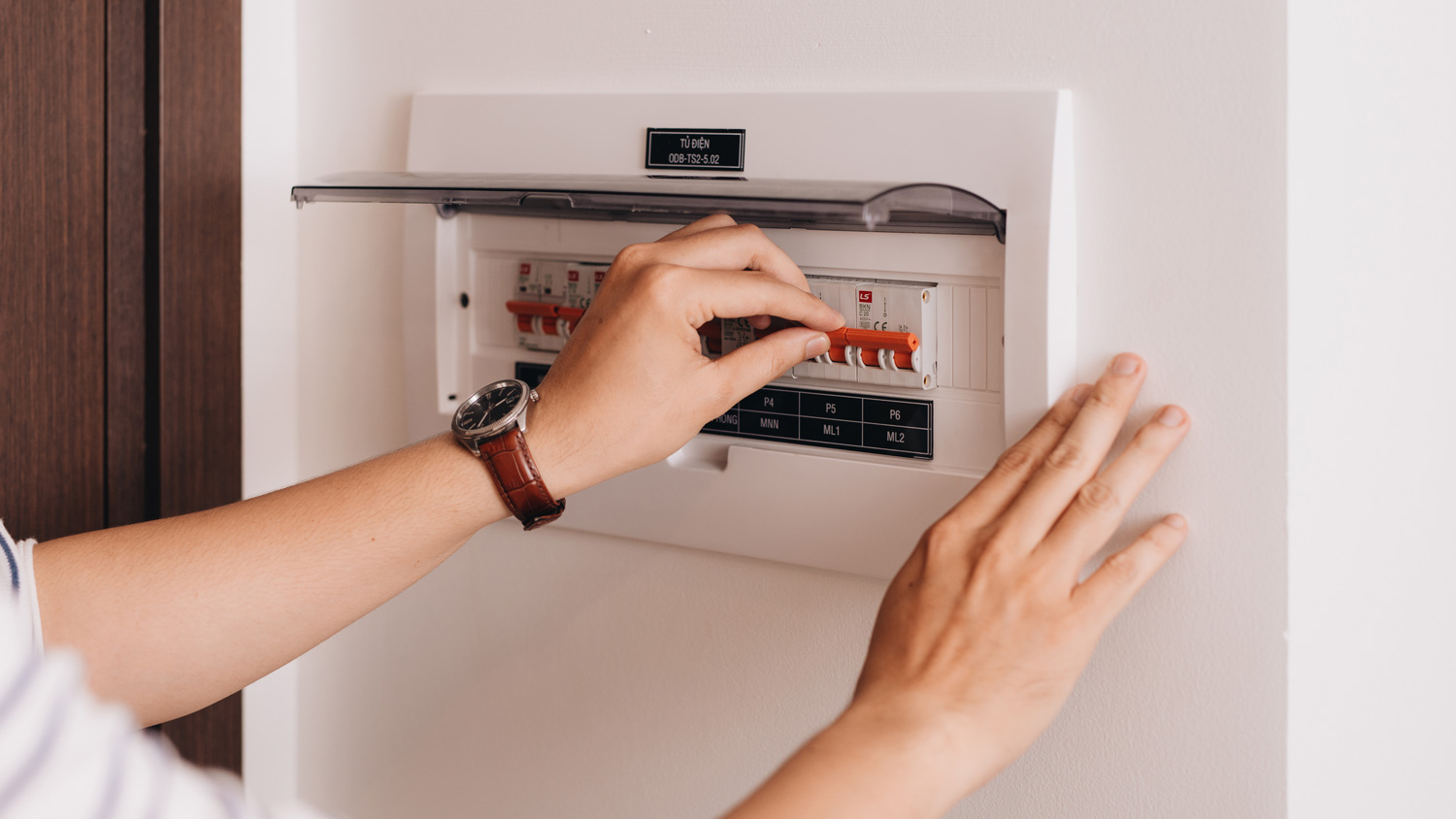
Find out how an EV charger installation can make your electric vehicle ownership experience even better. Learn about costs, benefits, and more.
Keep tabs on potential electrical dangers in your home


Common electrical problems stem from weathering, age, and animal damage
Some electrical issues are easy to fix, such as buying a new extension cord
Call a professional for help resolving major electrical problems, such as a damaged breaker panel
One of the critical duties of homeownership is to keep a vigilant watch for common, and sometimes dangerous, electrical problems. It may sound scary, but if you make it a habit to check for potential hazards, you’ll catch small problems before they become big issues.
Here’s the good news: Most electrical issues give away a few hints early on. Let’s review eight common electrical safety issues, plus how to spot their warning signs.
Holiday lights and DIY projects wouldn’t be the same without an assist from extension cords. But since they’re in constant use, damaged or exposed wires are common in worn-out extension cords. The visible damage serves as a warning sign that bigger problems, like an electrical shock, could be right around the corner.
If you ever pick up an extension cord and it feels hot, it means it's conducting too much power for its rated capacity and potentially could start a fire from overuse. Your extension cords should have a rating that supports the appliance you’re using.
Homeowners often mistakenly remove the extension cord by tugging the line from the wall instead of pulling the plug from the outlet. Over time, this action loosens the connection and exposes the wires inside the coating, leading to accidental burns or shocks.
If your extension cord has loose ends, or you've bandaged it with electrical tape, it's time to replace the extension cord. Damaged cords may have exposed live wires that can lead to electrical shock and fire hazards. When inspecting your extension cord, you should also look for other types of destruction, such as rodent bite marks, cuts from a wayward slice of a utility knife, and weathering from exposure to the outside elements.
A ground fault circuit interrupter (GFCI) is an outlet usually found in kitchens and bathrooms within six feet of a water source. This device prevents you from getting electrocuted if your plugged-in appliance comes in contact with water.
These outlets immediately stop the flow of electricity, also known as tripping, when they sense the slightest change in the electrical current. If your GFCI starts tripping repeatedly, you probably have a faulty appliance plugged in or have a worn-out GFCI outlet receptacle.
To see whether your appliance is the problem, unplug it and reset the GFCI by pushing the center button. If you plug it in again and the GFCI still trips, it works correctly and your appliance is faulty. But, if you think the GFCI isn’t working correctly, contact an electrician to replace it. Working with electricity isn’t a job for a DIY homeowner.

The kitchen may be considered the heart of the home, but your breaker panel gives the house life. Any damage to this powerful panel shuts down important conduits of electricity, like air conditioning and heat.
Ensuring that the panel remains in excellent condition helps you ward off any unwanted electrical disruptions. Keep in mind, electrical fire risks increase during the winter, so take a look at the condition of the unit well before the cold temperatures set in. Call an electrician if you see rust, corrosion, and damage from rodents, which all increase the chance of an electrical fire.
If you find exposed wires inside or outside of your house, it’s a good idea to investigate them for damage. They might have been chewed by animals or split and cracked from age. If so, exposed wires could cause sparking and possibly a house fire.
If you find damaged wires in the basement, attic, or any entrance leading from the outside, it’s best to call a local electrician for repairs to avoid precarious situations, such as an electrocution.
Light bulbs are such a common household item that you may overlook them as a potential fire hazard. But, if you use a light bulb with a higher wattage than recommended, it could overheat the light fixture and catch on fire. If you have a light fixture with multiple bulbs or a strand of lights, check all of the bulbs individually and replace them as they burn out. Consistent bulb wattage avoids the risk of fire.
If your outlet faceplate is warm to the touch, you probably have an oversized electrical load operating on that unit. So, you’ll need to monitor any warm faceplates to avoid burns or fire hazards from an overheated outlet or wires. If the problem persists or the faceplate becomes hot, call an electrician.
There is one exception to this rule: If the faceplate has a dimmer switch and it’s warm (not too hot to touch), it's okay to use. This is a normal trait of a dimmer switch because electricity moves through the circuit and redirects the power to dim the lights, which makes the plate feel warm.
It’s easy to write off a wobbly ceiling fan as just being old or worn out. But an unbalanced fan with warped blades can loosen the connection to the attached electrical box, which can fray the interior wiring. With damaged wiring, gravity could take over and the fan could fall, risking injury from the landing, or at least hang precariously, inviting electrical shock.
If you think your fan still has life left in it, call an electrician to fix the damaged wires. If not, take this as a sign to replace your ceiling fan and install a new one.

Has your vacuum ever shut off suddenly? You weren’t doing anything out of the ordinary, like swinging the cord like a jump rope, but the plug still fell out of the outlet from the vacuum vibrations. It’s most likely because the outlet is loose. Yes, they can wear out and need replacing.
Sometimes, loose electrical outlets spark. Consider this a mild warning sign of future danger. For a quick fix, check to see if the outlet receptacle or the outlet in the electrical box is unscrewed. Adding plastic shims to the outlet could fix the problem, or you might need to hire an electrician for a new outlet receptacle or outlet replacement.
From average costs to expert advice, get all the answers you need to get your job done.

Find out how an EV charger installation can make your electric vehicle ownership experience even better. Learn about costs, benefits, and more.

Keep pool-side dreams from getting short-circuited by being aware of pool electrical installation costs and how they can affect your overall budget.

Electrical subpanels allow you to use appliances and electronics safely. This cost guide explains the important factors to consider when installing a subpanel.

Safety outlets cut power to connecting devices for various reasons. Learn how to reset GFCI outlets yourself and when hiring a pro is best.

Wondering how to tell if a circuit breaker is bad? There are several warning signs you should know to help keep your family, home, and electronics safe from shortages and fires. Keep reading to learn the signs to watch out for with circuit breakers.

Learn how to strip wire safely and effectively with these tools and techniques.